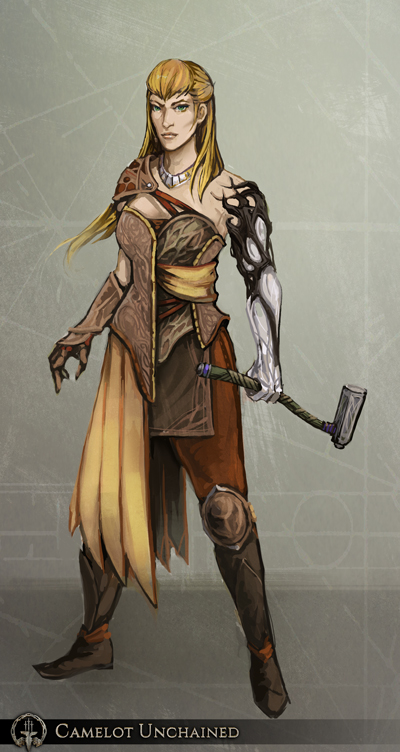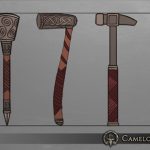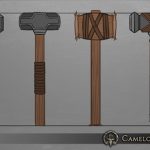
In anticipation of the today’s livestream, Camelot Unchained boss Mark Jacobs spoke with us about the implementation of crafting and trade in the game as explained on the website on today’s stream. It’s Jacobs, so you know the answers aren’t bullshit.
Massively OP: Regarding merchant stalls in lieu of an auction hall: From other MMOs, I know that there will inevitably be one really great, convenient spot for stalls, and if you’re not there, you’re sunk without a search system. So first, is there going to be a “vendor search” system so people can tell what’s for sale and where? And second, how are you going to deal with demand for the stalls in the “best” spot? And if the answer to this is bidding wars and auctions for the best stalls, how are you going to stop uberguilds from dominating all serious trade? If the answer is extremely high rents, how are you going to ensure that people still sell the “cheap” stuff (like lowbie gear and consumables) that isn’t worth it to stock in high-demand, high-rent areas (this is also a serious problem in modern Ultima Online, for example, like reverse food deserts).
Mark Jacobs: Great question, but I hope you’re prepared for a long answer. However, since you and your readers know me, you knew going in that it would be hard for me to write a short answer to a question like this one.
First, you are absolutely correct that the location of the stall in some MMORPGs can be a real PITA for new or individual crafters who are trying to keep up with top guilds. Like many of the problems in MMORPGs, there is no silver bullet to solve the problem. The way we are going to address it is through a multi-pronged approach, including how the vendor area is laid out, guild houses, and Realm Rewards.
To begin with, I’ll just touch on Realm Rewards, in order to keep this answer from being an article unto itself. The spots in the various vendor areas will not be able to be auctioned, they will have to earned and retained by gameplay. If you want one of the better spots, you will have to earn that spot by serving your Realm. And once you earn it, it cannot be transferred to another account; it belongs to your character (it may be character-locked, but this hasn’t been decided yet) for as long as you can retain it by your performance in the game. Now, will this be a grind for the crafter? No, but you won’t be able to keep your license to that spot by not playing, either. There is a nice balance between the two, and we expect we’ll find it. Now, while you might say that this might help the problem a little, but in the end, won’t the crafter guilds still have an advantage? Sure, but the performance of the individual character is the yardstick by which everything is being measured, so you can’t simply dump cash into the character to buy the slot. And since our crafting system isn’t built around making 1000s of items a week, a guild crafter won’t have as big of an advantage as in a game like WoW, for example.
As to the 2nd part (lowbie gear), my hope is that as new crafters come into the game, they will create the gear that their combatant counterparts need. And if that doesn’t happen, we can easily supply the gear to the player through the Merchant Guild. I’d prefer not to do this, but, as you ask below, we do plan on managing the economy to a certain extent. As a matter of fact, during the Kickstarter I said that we absolutely reserved the right to add items/materials to the supply chain if one Realm is overwhelmed numbers-wise by another Realm, to try to slow the flight of people from that Realm. We also need to be prepared for the problems that would arise if we simply don’t have enough crafters in the game. While we might think this is a great crafting system, we can’t count on that. Thus, we need to be prepared for that situation right from the get-go.
If merchants have to pay dues to be able to sell in stalls, do consumers have to pay realm taxes to be able to buy? Who is really bearing the burden of the gold sinks attached to the trade system?
Combatants bear their share of the gold sinks via item decay/replacement, and merchants have dues, store licensing, etc. The idea is that both sides of the equation have to pay, and that eventually, some money is taken out of the economy. If money is never taken out of the economy, you will end up with “mudflation” really quickly. Now, combatants will also have to pay for things like their housing plots (in-game currency only, of course—no cash shop plots here), training fees, etc. so they too will push some money out of the economy.
Regarding caravans: Several MMOs have this mechanic now, and I always love it in theory… but in practice, people stop bothering with caravans because the number of people required to attack and/or defend one is rarely commensurate with the value of the loot being transported. How will you ensure it’s worth it to actually caravan your stuff? (And will we ever see that ship-to-ship combat?)
Well, the first thing to understand is that in this game, you have to use caravans, because of our encumbrance/carrying capacity stat. Even with pack mounts, players can’t simply load up with many suits of armor, multiple weapons, entire libraries of books, etc., and carry them from one area to another like you can in most other MMORPGS. Thus, caravans, by design, become important parts of the game. Now, whether it is worth it or not will depend on what’s being carried in them. Looting caravans of goods owned by the Realm will, at times, be absolutely worth it. While we are not making a “full loot” game, we never said that caravans that are carrying Realm goods can’t be looted. So, finding, fighting, and looting the choicest caravans will be a win for the attackers, as will be defending those caravans. In terms of looting player caravans, because we have said this is not a FFA, full loot game, you cannot lose all your stuff when you ship it by caravan. OTOH, you will have to pay for transportation fees/insurance (in-game) if you do decide to ship via ArtEx. :)
You note that lowbie crafters will be able to make “full” items, not just parts of them to pass up the chain to uber crafters. Do you mean “full” items for other lowbies?
Yes.
If so, what happens when the game matures and there are no more lowbie combatants to buy lowbie goods? Why would anyone become a crafter at that stage in the game? And if those items are for everyone, not just lowbies, do you anticipate a lot of crafters stopping right there and equipping their mates with “good enough” stuff to avoid paying high decay costs?
You’re assuming that expensive gear will decay faster, or as fast, as lowbie gear. Now, while that system has been used in other games, I haven’t decided yet whether it has to work that way in our game. If we have set up the economy properly, we don’t have to keep upping the repair cost of items. I’d rather not force people to make that choice in our game.
Tying into that last, regarding the goals of rarity and decay and risk-vs-reward and lures for crafting RNG: Do you anticipate a gameworld like classic UO, where everyone was wearing “cheap” crafted gear rather than their best stuff for everyday adventuring because they didn’t want to lose it (in UO’s case, through decay and looting, but here, through decay)? Or do you think that three years down the road, everyone will be wearing the elitest of the elite stuff, no matter how much decay pulls out of the world? The same for consumables — really, what are the majority of people going to be using and wearing on the daily?
You’re correct about what happened in UO and other games. In our case, since there will be a lot of choices that players will have in creating their armor and weapons, I’m hoping that there isn’t the “1 set of stats to rule them all” for armor, weapons, etc., even as people reach softcap. Now, one thing to keep in mind is that with the slow and steady leveling curve of this game, I think it will take longer for the vast majority of the game’s population to reach that point. And by the time they did, we would have a real good handle on the desires of game’s active population, and we could decide if we needed to add slightly more verticality to the game. This would, of course, assume a population where very few new people are entering the game, and the dedicated core wants to see some changes. At that point, we would be foolish not to at least consider doing just that.
You note several times through the document that making all of these principles work together in harmony is going to be a delicate balancing act, and it’s clear CU’s crafting economy is going to be well-planned to limit mudflation. Is it going to be maintained and tweaked in the live game by an in-house economist too a la EVE Online and Guild Wars 2, or set free to develop as it will? How much do you anticipate tweaking the economy of the world once we’re in it wrecking it up and destroying all your plans for us?
Well, I don’t know if we will have a full-time economist, but I would like to be able to hire one going forward. I don’t think we should simply say that it should be “free to develop as it will,” because we made the initial decisions in designing the system. If those decisions were wrong and bad things happen as a result, it is our responsibility to correct those mistakes and not just throw up our hands and say “it’s the players’ fault!” OTOH, if the players are taking it in a direction that is beneficial for the game, good on them and we will support it. I hope that we will only have to tweak things, versus blowing up the world and restarting things.
Can we expect maker marks on crafted items, above and beyond the engraving system?
Absolutely! Maker’s marks are confirmed for the game. They are an old MUD-thing, and as such, near and dear to my heart.
Regarding research: How will you avoid the trap of research being random (like WoW) or predictable/look-uppable (like every other video game with a wiki)?
Honestly, I don’t know yet. This is one of the things that I’m considering but haven’t worked my way through yet. Research is one of those systems that I wanted to add to my old 4X game Galaxy but never did, and I did want to really explore it in other games, but never really got around to designing a great system. I think there is a way to do it well, but I’m not yet convinced it is worth the effort. So, this is definitely one possible feature that may not make the cut.
The Vox Magus is an incredible concept — maybe a cross-between SWG factories and crafting stations, with the potential for portability built in (crafting droids, anyone?). Do you think it’s going to look silly that every crafter is dragging a mobile one around? Can the mobile version (if implemented) be destroyed by enemy players? Do combatants have an equivalent toy/ball-and-chain?
Thanks, that kind of compliment means a lot to me coming from you. I do think Raph [Kosters]’s fantastic work on SWG’s crafting system, as well as some other designers’ works, influenced me here. No question about it. Most designers, including myself, occasionally have revolutionary ideas, but usually we all are evolutionary. This is no exception, and that isn’t a bad thing. Now, I do think I’ve added some nice bits to the core concept of a crafting station, but I certainly wouldn’t take credit for coming up with the core concept behind the Vox.
In terms of dragging it around, yeah, that would look dumb. OTOH, crafting in this game does have to take place at a Vox or similar device, so I expect many crafters will leave their Vox back in their home/store while it is working on something with an Non-Player Character Assistant (NPCA) or Player Character Assistant (PCA) while they go out and do other things. I might also set up the Vox so that players can have multiple Voxes, but there can be only one of them operating at any time. So, if a player wants to go to another city, he could take a special gem with him, which he could insert in a public/secondary Vox and work there.
As to whether a mobile version could get destroyed, that would depend on the situation, of course. A crafter who takes a Vox into The Depths™ could see something bad happen to it, but that would be a classic risk vs. reward choice. In terms of a ball-and-chain for combatants, the closest thing would be the mage’s spellbook, which is a production in its own right for the spellcasters.
Regarding Vox Power: This is basically an energy system for crafting. Usually it’s a hated system because 1) games exploit it in the cash shop and 2) some people want to just keep on crafting and not do the other things you’re trying to ensure they can do. You have a few plans for fast recharge on the Vox, like buying backup power (from whom? are power manufacturers going to be the real powertraders here?) and a button for using tomorrow’s power today. How will you ensure that people don’t just log out when they’re really truly out of Vox Power? Do you anticipate the most hardcore crafters logging in every two days, or playing alts, if they are not interested in combat or harvesting?
Yeah, I know, energy systems are not usually loved by players. However, as you point out, there are ways around it, and I can guarantee we won’t use it for a cash shop since, well, I’ve promised there won’t be a cash shop for Camelot Unchained, and I have no intention of breaking that promise. The real question is whether an energy system is one of the pieces in the very complicated jigsaw puzzle of a balanced economy. If it is, players may not love it, but players also dislike some systems/mechanics that are part of many MMORPGs. Downtime, in general, is not beloved by players, but it is an accepted part of most MMORPGs. And, in our case, we are not going to implement an energy system that will prevent the average player from having fun, but how many “average” players play the game twenty-four hours a day, seven days a week?
In terms of what else the crafter can do, that’s the key to making this system work. If crafters have other things to do, the energy system on their Vox won’t be a big deal to most of them. Again, the system isn’t being designed so that you can only use your Vox two hours a day—that would be dumb. OTOH, I don’t think it’s dumb to prevent a Vox from being “hot-seated” by a guild or group of players sharing accounts. We’ve been very clear that we want to make this game accessible to players who have more time/desire to play, as well as to those who don’t. If players who don’t have as much time to play as others find themselves at a huge disadvantage, many won’t bother to play, especially if they are crafters. So, we have to balance both ends of the spectrum, so that those crafters with more time will feel rewarded for putting in the extra effort and those with less time can still have fun and make money. And that indeed is the rub. Hopefully, things like Taking (gathering, harvesting, mining, etc.), RvR, building, etc. can help fill in some of those time gaps. And again, they key takeaway here is that I’m not talking about a system where you can only use the Vox a few hours a day.
Regarding automation in resource gathering: Are you concerned there will end up being huge stockpiles of resources lined up behind the crafting time bottleneck created by Vox Power?
I think that there will be a stockpile for the more active crafters and guilds, and that is not a bad thing at all. That will help create a demand for other crafters to do some purifying for other crafters, and that will help build the social network between crafters. It will also encourage alts, and that is also not a bad thing, especially for an alt-o-holic like me.

The physical crafting process sounds a bit like the original EverQuest II crafting dance, which was lots of fun… the first 50 times. And then it became something you did almost by rote, letting your fingers dance while you watched TV out of the corner of your eye. How will the Vox’s many buttons and levers feel different in practice? Is each crafter profession or item type going to have a different type of minigame to make it go?
Yeah, I’m trying to avoid that. My approach is that by the time you have really mastered certain aspects of the system, you will either turn some of those tasks to an NPCA/PCA, or farm out to another crafter. As to each profession having its own minigame, no, that would defeat one of the reasons for the Vox, to save us time/money while still having a great and deep crafting system. Each stage of crafting will have its own setup for the Vox, but not each profession.
I like the notion that some items will take a long time — possibly days or weeks — to manufacture (a la SWG, EVE, and Fallen Earth). But what about basics like a plate of buff food? Obviously, you don’t want the game flooded with consumables (see: Guild Wars 2), but meatloaf that takes a week would be ridiculous. What’s the plan there?
Thanks! The concept of some items take time to manufacture came from my 2nd MUD, Dragon’s Gate. In that game, you went to the store, and ordered a weapon to your specifications. You then were told how long it would take and hours/days/weeks later, you would go pay for it and pick it up. I think that this kind of system for Camelot Unchained is another necessary step to having a decent economy. As for consumables, yeah, it would be dumb to have a meatloaf that took a week. So, I suspect that if/when we put in a consumable system for the game, it would either require a different system entirely, or, that it would put a strain on the Vox (“Damn it Mark, I’m a swordmaker, not a baker!”). I haven’t spent any time so far worrying about things like food, simply because weapons/armor are higher priorities for both my team and, I assume, my Backers.
Loving the SWG-style property system. Are you planning on having set resources with predetermined properties (“everyone knows that unobtanium has the highest density for making dreihanders”) or will you adopt the SWG system of random spawns and random (within caps) properties?
Thanks. That system comes from Dragon’s Gate too, albeit in a much simpler form than was seen in SWG and other games, but I used the core concept in that MUD back in the mid-80s, as did other MUDs that followed. :) I need to put that game back online some time.
As to having set resources, it needs to be a mixture of both. During the Kickstarter we talked about having a wide range of resource spawns, including in safe areas. So, I think it is reasonable to say that in the safe areas, the materials spawned there will have a lower quality than those spawned in the more dangerous areas. And areas like The Depths will also contain even higher quality spawns and unique materials. And yes, no matter what, there need to be caps on every step in the crafting process, from taking to making. As a matter of fact, Ben and I were discussing that last week. :)
Regarding repair: Does everyone have to be online and in-person when repairs take place?
Probably not.
Are crafters who repair items rewarded with skill?
Yes.
What happens when there are no crafters around willing to repair – are you stuck with your own popcorn crafting to get by?
Maybe. If your Realm is under siege and outnumbered, NPCs may step in to help with repairs. The same mechanic could work during server lulls.
Is there a secure system for paying for player repairs? (Ultima Online and SWG solved that problem with repair contracts and kits, basically crafted consumables, so I have to wonder how a modern game opposed to offline trade will do it.)
There needs to be. I said during the Kickstarter that Realm pride is hugely important to this game. Thus, it becomes necessary to have a system where players can’t cheat each other in a “take the mats and run” situation.
Relatedly, how much of the player-to-player apprentice system will be automated vs. in-person only? (I’m thinking bulletin boards, offering crafting “quests” to other players?)
I wanted to have a pretty robust work order system for WAR, and well…yes, crafting questions/work orders/bounties are things I want to see in the game.
This is something related to crafting that I still feel fuzzy on: The way everyone is described is either combatant or crafter. You can be a combatant who does a little crafting, or a crafter who does a little combat. What about someone who wants to do both evenly, or both hardcore? What kind of space is open for those players, assuming they have real-life time in excess?
If you have the time, you can do both on separate characters. The key to making a separate crafting class was to set up a system where players who want to craft but don’t want to be active in RvR can succeed. The moment you put the two together on one character, then you diminish the chance for the average pure crafter to succeed. Thus, we are not going to allow that. Yes, we can’t stop somebody who wants to play a full-time crafter and a full-time combatant, but that will still take lots of time. OTOH, if we said that a full-time combatant could also be a successful crafter using the same character, it would really put the non-RvR crafter at a big disadvantage.
Toward the beginning of the doc [sent to press for preview], you refer to a number of MMOs with great crafting systems, but it’s SWG you mention over and over, and it’s SWG you’re borrowing from most heavily. Are you setting up CU to attract SWG fans specifically? And is CU the game where SWG fans can “come home” as the infamous quote goes?
Well, in my mind, I’m building on a number of other games, especially Dragon’s Gate, but also MMORPGs such as SWG and others, no doubt. I mention SWG a lot since, well, unless you were a MUDer who played on GEnie/AOL, you wouldn’t know about DGate. The real difference is that Raph built a great crafting system for SWG, while I just used the principles to set up a shop that specialized in work orders.
Am I aiming straight at SWG fans? No. Would I love for them to be interested in this game? Yes, of course I would. But, I also would love folks who loved playing crafters in other games, including Dark Age of Camelot, to look at this game as a potential landing spot.
And as you mention, there are other games that might be more attractive to true SWG fans, such as The Repopulation (which I hope resolves its current engine issues), but I absolutely have been envisioning this crafting system as one that would be viewed as a new hope (sorry, couldn’t resist given the timing, please forgive me) for players who want to play a full-time crafter. During the Kickstarter, I made no secret of the fact that I wanted to design a system that would be attractive to that type of player. And, if they came from SWG, Dark Age of Camelot, UO, etc., that’s all the same to me. All I care about is designing a great crafting system that crafters will want to play, and not one that they feel forced to play.
And are you a little concerned that you might attract more hardcore crafters and generate more supply than the rest of the game can logically accommodate (don’t laugh: It happened to SWG!)?
No, not really. The reason I’m not too worried about it is because of the way the system is being designed to prevent the dumping of too many goods on the market. If the crafting process wasn’t capped via the Vox, yeah, I would be more worried about it. But, because I am willing to say that no, you can’t just have materials dumped on you by your guild and make more items in a day than a sweatshop can, then I am also willing to say that even if we have more crafters than we expect, the number of excess goods that we will have will be much smaller. In a game where there is no real limit, other than raw materials, that a person can create in a day, an excess number of crafters (or simply an excess number of crafters who have an excess number of raw materials), can really mess up the economy. We’ve all been there and seen that before. However, in this system, that can’t happen on the same level.
We’d like to thank Mark Jacobs and the CSE team for giving us an early peek at the crafting plan and providing us with exhaustive answers to our questions.
























